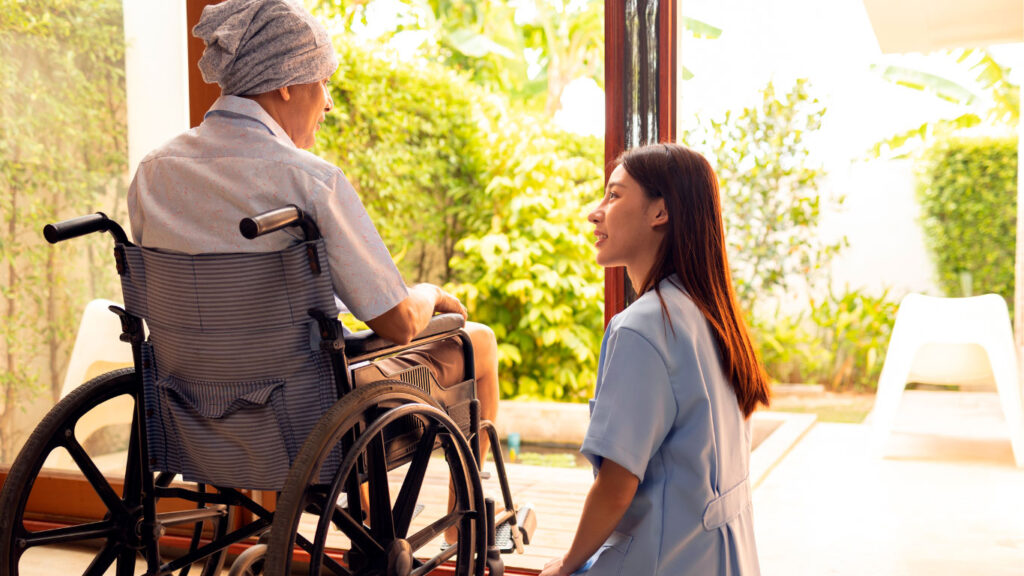Deciding to seek in-home medical care for a loved one can be difficult, but recognizing the signs early can make a significant difference in their quality of life and well-being. Many families face the uncertainty of whether their loved one needs home care or if they can still manage independently.
In this article, we will help you identify the key signs that indicate someone may benefit from in-home medical care, the most common conditions that require this type of service, and the importance of having specialized professionals to ensure the best care.
Signs that a Loved One May Need In-Home Care
If you’ve noticed changes in your loved one’s health or independence, it is important to pay attention to the following signs:
✔ Difficulty moving and frequent falls – If the person has trouble walking, getting out of bed, or moving without assistance, this can increase the risk of injury. Physical therapy and home health aides can help improve mobility and reduce risks.
✔ Memory problems and confusion – Conditions such as Alzheimer’s or dementia may cause the person to forget to take their medications, eat properly, or perform basic household tasks. A specialized caregiver can ensure they receive the necessary support.
✔ Poor personal hygiene – If you notice the person has stopped bathing, dressing appropriately, or maintaining their hygiene, it may be a sign they need daily assistance with these activities.
✔ Weight loss and malnutrition – Lack of appetite, difficulty cooking, or trouble chewing and swallowing can lead to poor nutrition. Home assistance can ensure the person receives proper and healthy nourishment.
✔ Difficulty managing medications – If your loved one forgets their doses, takes medications at incorrect times, or mixes different treatments without supervision, a specialized nurse can ensure safe medication management.
✔ Recovery from surgery or illness – Patients who have undergone surgeries, heart attacks, strokes, or serious illnesses may need post-operative care, medical monitoring, and therapy for a safe recovery at home.
✔ Social isolation and depression – Older adults or those with reduced mobility may experience loneliness, anxiety, or depression due to a lack of social interaction. Having a caregiver at home can improve their emotional state and well-being.
Common Conditions that Require In-Home Medical Care
Certain chronic diseases and medical conditions can hinder a person’s independence, making in-home care the best option. Some of the most common conditions include:
1. Neurological Diseases
• Alzheimer’s and Dementia – Patients may experience confusion, memory loss, behavior changes, and difficulty completing daily tasks. A caregiver can help ensure their safety and well-being.
• Stroke – After a stroke, many people have difficulties with speech, mobility, and coordination. Rehabilitation with physical, occupational, and speech therapy at home is essential for recovery.
• Parkinson’s Disease – Tremors, muscle rigidity, and loss of balance can make daily activities challenging. In-home care can include therapy to improve mobility and autonomy.
2. Cardiac and Respiratory Diseases
• Heart failure – Extreme fatigue and difficulty breathing may require monitoring and help with medications.
• COPD (Chronic Obstructive Pulmonary Disease) – People with COPD may need oxygen therapy and support in their daily routine to avoid respiratory crises.
3. Chronic and Degenerative Diseases
• Diabetes – Managing diabetes requires regular blood sugar monitoring, insulin administration, and diet management.
• Arthritis and Osteoporosis – Chronic pain and bone weakness can increase the risk of falls, making home care essential.
4. Post-Surgical Recovery and Rehabilitation
• Post-surgical patients – After major surgery, patients may need specialized nursing care for wound healing, pain control, and rehabilitation.
• Hip and knee fractures or replacements – In-home physical therapy is crucial for effective recovery.
5. Palliative Care and Terminal Illnesses
• Advanced Cancer – In-home care may include pain management, palliative care, and emotional support for both the patient and the family.
• Terminal illnesses – A team of specialized nurses and health aides can ensure maximum comfort at home.

Why Is In-Home Medical Care Important?
In-home care offers multiple benefits for both the patient and their family:
✅ Greater comfort and well-being – Being at home helps reduce stress and improve recovery.
✅ Personalized care – Care plans are tailored to meet the specific needs of each patient.
✅ Continuous medical supervision – Professionals can monitor the patient’s health progression and prevent complications.
✅ Greater safety – It eliminates the risk of falls or accidents at home by ensuring proper assistance.
✅ Emotional and social support – Caregivers can provide companionship and improve the patient’s mood.
At Advance Abilities Health, we understand how important it is to offer quality care at home. Our team of highly trained nurses, therapists, and health aides is ready to provide the best care for your loved one.



